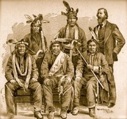Writing on Native America
"Ishi's journey provides an ethical map," column in the San Jose Mercury News: "Travel with me deep into the forest of white birch and evergreens that covers our reservation in northern Minnesota. Veer far off a hole-riddled dirt road so seldom used that brush has overtaken it. This is one of the hidden spots where families come to bury Chippewa old-timers when the final day comes ... Why I am I telling you this? Because I want you to imagine this place and these people when reading stories about Ishi. The Smithsonian Institution has been keeping the brain of that legendary California Indian in a forgotten vat stored in a Maryland warehouse ..."
"Bilingual wars: Save tribal language despite English-only movement," column in the San Jose Mercury News: "In the early 1900s, with the Indian wars finally declared dead, the federal government set out to re-educate America's tribal people. Its motto: "Kill the Indian, save the man." The Chippewa people in northern Minnesota endured that cold campaign to extinguish indigenous languages and cultures ... Thankfully, the federal government has wised up to its past errors. Congress in 1990 passed the Native American Languages Act, which declares it the official policy of the United States 'to preserve, protect and promote the rights and freedom of Native Americans to use, practice and develop native languages.' There's urgency to those wonderful words ... "
"Few tribes are dealt a winning hand," commentary in the Oregonian: "Tribal sovereignty -- a concept that many Native Americans defend and revere with a near-religious fervor -- defies easy legal definition. In general, federal lawmakers and judges have not permitted tribal actions considered inconsistent with a tribe's 'dependent' relationship with the U.S. government. For example, tribes can't sign treaties with foreign nations. Whatever the definition, tribal sovereignty is at the heart of a complex body of legal regulations known by judges and lawyers as 'Indian law.' The field includes treaties, legislation, executive orders, administrative rules, and judge-made case law. This array of legal authority combines to make the nation's tribal members the most regulated minority group in America ..."
"Santa Ynez hysteria," column in the Santa Barbara News-Press: In its slash-and-burn assault on tribal sovereignty, the approach of the anti-tribal group in the Santa Ynez Valley is "to throw out as much fear and misinformation as possible, and hope something sticks ... I was surprised that I've been caught up in their hysteria ...
“The anti-tribal group has been circulating a column I wrote (for) the San Jose Mercury News. From seven years ago, it details the initial struggles when a casino comes to a rural and poor reservation in the Midwest. I've refined my own views of reservation gaming, particularly in California where the circumstances are different than on more isolated tribal land in the heartland. In the last seven years I've also seen the importance of job creation for tribal members in casinos on large Midwest reservations where virtually no jobs existed before. I mentioned this all in print on many occasions ... The Santa Ynez 'concerned citizens' ignore this, as they ignore the facts about the Chumash. Neither Indian tribes nor tribal members can be frozen in time, although these folks want them to be to fit their stereotypes ..."
"Tribes can't waste this moment," column in the Santa Barbara News-Press: "The election sent an encouraging message that Californians don't want to repeat the history of reneging on agreements with Indian nations. Voters overwhelmingly rejected Proposition 68, a measure that could have undone the previous will of the voters and allowed non-tribally owned casinos. Its passage would have amounted to yet another broken promise. Californians didn't want to go there, but will Prop. 68 be the last attempt? Tribes can't waste this short moment of casino income. It can provide the financial footing to make long-term investments in education and business enterprises that will help make sure tribal governments are here for more centuries to come ..."
"Chumash endure county's hypocrisy," column in the Santa Barbara News-Press: "From the surreal file: When in Amsterdam earlier this year eating at an (Asian) Indian restaurant, the waiter from India went on and on to us about how he vacations in Solvang because he loves the Danish atmosphere. I'm unsure why someone would travel halfway across the world to a faux Danish village when Denmark is just a short hop from Holland. But it's just one thing I don't get about Solvang. Another thing I fail to understand is how residents of the Santa Ynez Valley can carp about the tasteful Chumash Casino Resort, with its hints of California native style, when there's a tourist-generating ersatz Danish town plunked right down in the midst of a California paradise. The California Nations Indian Gaming Association is meeting at the Biltmore Four Seasons in Montecito this week. The group's 'economic summit' is today. And attendees are sure to learn about the hypocrisy of the Santa Barbara County government and certain 'concerned citizens' when it comes to the Santa Ynez Chumash government's entrepreneurial operations ..."
"Different path to diversity," editorial in the Oregonian: "Seven Oregon public universities are about to begin charging resident tuition to out-of-state members of tribe's indigenous to Oregon. To maintain the integrity of the program, educators must be mindful of the fine legal distinctions between members of tribes and other minority groups -- and only half of the country's (self-proclaimed) Native Americans are tribal members ..."

















